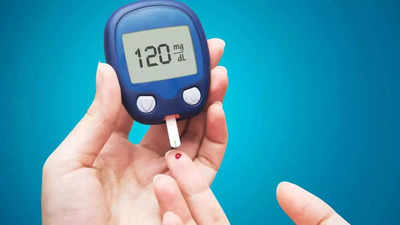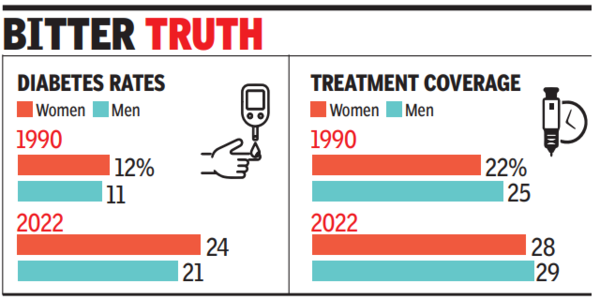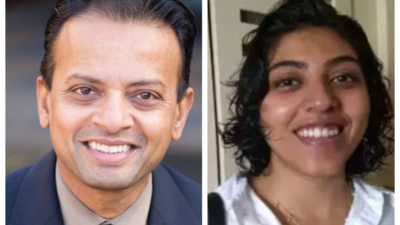
NEW DELHI: India has the highest number of persons with untreated diabetes, claims a new study published in The Lancet medical journal.
According to the study, an estimated 828 million adults (aged 18 years and older) had diabetes in 2022. Of these, over a quarter (212 million) lived in India, followed by 148 million in China, 42 million in the US, 36 million in Pakistan, 25 million in Indonesia, and 22 million in Brazil.
The study was carried out by the NCD Risk Factor Collaboration (NCD-RisC) — a global network of health scientists that provides rigorous and timely data on risk factors for non-communicable diseases (NCDs) for 200 countries and territories, in collaboration with WHO.

Senior author professor Majid Ezzati of Imperial College London, said the study highlights widening global inequalities in diabetes, with treatment rates stagnating in many low- and middle-income countries where numbers of adults with diabetes are drastically increasing.
“This is especially concerning as people with diabetes tend to be younger in low-income countries and, in the absence of effective treatment, are at risk of life-long complications — including amputation, heart disease, kidney damage or vision loss — or in some cases, premature death,” Ezzati said.
According to the study, global diabetes rates doubled in men (6.8% to 14.3%) and women (6.9% to 13.9%) between 1990 and 2022. Low- and middle-income countries (LMICs), experienced the largest increases while some higher-income countries, such as Japan, Canada and some countries in western Europe (eg. France, Spain and Denmark), saw no change or even a small decrease in diabetes rate over the past three decades.
In India, the researchers pointed out, the diabetes rate nearly doubled in women and men. In women, it went up from 11.9% in 1990 to 24% in 2022. In men, it went up from 11.3% to 21.4% in the corresponding period. In comparison, the treatment coverage increased only marginally for both genders; 21.6% to 27.8% in women between 1990 and 2022 and 25.3% to 29.3% in men in the same period.
Dr Sachin Kumar Jain, professor and HOD, department of endocrinology at Amrita Hospital, Faridabad, said India’s status is a sobering reality and highlights a pressing public health challenge. “
The reasons behind this situation are multifactorial — limited access to healthcare facilities, socio-economic constraints, cultural perceptions and lack of awareness about diabetes,” he said,“From my experience as an endocrinologist, early detection and continuous care can drastically alter diabetes outcomes. Collaborative efforts between govt bodies, healthcare professionals, and community organisations are vital to mitigate the burden of untreated diabetes in India, improve health literacy, and deliver timely, equitable care across all geographies.”
Dr Anoop Misra, chairman Fortis C-Doc, told TOI untreated diabetes is a serious problem. However, he added, that treatment coverage is unlikely to be less than 30%, as reflected in the Lancet study. “Many people opt for alternative therapies, some self-medicate and there are many others who try to deal with the condition by lifestyle modification until the condition worsens. All this is true and requires urgent action,” he said.








![Best Weight Loss Supplements [2022-23] New Reports!](https://technologytangle.com/wp-content/uploads/2022/12/p1-1170962-1670840878.png)




